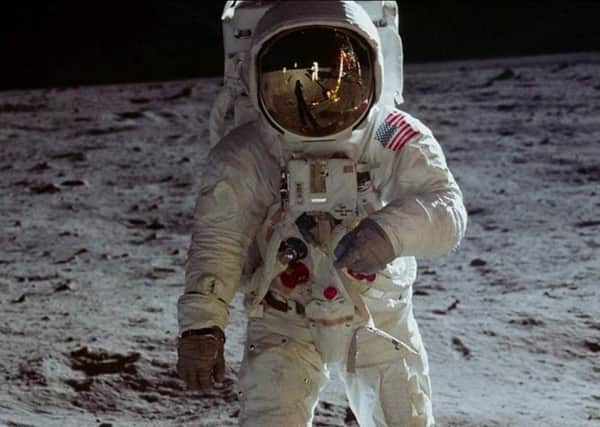Film reviews: Apollo 11 | In Fabric | Support the Girls | Yesterday | Robert the Bruce


Apollo 11 (U) ****
In Fabric (15) ****
Support the Girls (15) ***
Yesterday (12A) **
Robert the Bruce (15) **
Awe-inspiring cinematic experiences are few and far between, but Apollo 11 is precisely the sort of film that’s worth seeing on the biggest screen possible for this very reason. A documentary drawn from thousands of hours of gorgeous, never-before-seen footage of the immediate build-up to, launch of, and return from the first Moon landing, it plays like a Robert Altman film that just happens to have been made in the midst of one of the most significant human achievements of the 20th century.
Directed and edited by Todd Douglas Miller, the film makes brilliant use of pristine 70mm footage to place us in the moment, setting the scene with stunning shots of huge trucks ferrying massive rockets to Cape Canaveral – a moment that helps convey both the majesty and mundanity of everything involved in getting Neil Armstrong, Buzz Aldrin and Michael Collins into space. Miller’s commitment to the found-footage format is what really makes the film special. There are no talking-head interviews, no after-the-fact remembrances, no contextualising of the footage beyond venerable US anchorman Walter Cronkite’s reports from the time. Instead, the film trusts the historical record and trusts that by immersing us in the control rooms and in the crowds lining the highways and byways of the Florida coast (it’s estimated that almost a million people turned out to watch the launch) it can convey the drama and spectacle in a much purer way.
Advertisement
Hide AdThat’s not to say there aren’t stylistic embellishments. The aforementioned reference to Altman comes through in the sound design, which layers in overlapping dialogue, impenetrable tech talk and audio feeds from the astronauts to draw us in deeper as we try to make sense of the commotion. Miller’s frequent use of split screens also gives the film a very late-1960s cinematic feel – and Matt Morton’s score enhances the collective breath-holding that took place by amping up the tension, even though we know the outcome. With the 50th anniversary of the mission imminent, the film serves as both a glorious tribute to that moment and a positive, hope-filled reminder of the good that can be achieved even in times of great political turmoil.
Idiosyncratic British filmmaker Peter Strickland (Berberian Sound Studio, The Duke of Burgundy) returns with another gloriously perverse horror offering courtesy of In Fabric, a film about a demonic dress that does terrible things to anyone who wears it. Set in pre-internet 1990s suburban London and divided into two separate-but-linked stories, the film kicks off Marianne Jean-Baptiste (Secrets and Lies) as Sheila, a bank clerk and single mother of a feckless teenager whose decision to re-enter the dating scene prompts her purchase of a killer red dress from a high street department store run by staff who are only fractionally weirder than her own passively aggressive bosses (amusingly played by Julian Barratt and Steve Oram). The second story features Leo Bill and Hayley Squires as an about-to-be-married couple whose lives are terrorised in increasingly elaborate ways by the same dress after it’s used in a stag-night jape. Plot description doesn’t do Strickland’s work justice, though. As he did with Berberian Sound Studio and The Duke of Burgundy, he uses In Fabric’s genre set-up to tease out the kinks and perversities of the everyday world he’s exploring in hypnotic fashion. The British high street has never seemed so strange.
A leading dramatic role for rising star Regina Hall (Girls Trip) is the best reason to see Support the Girls, a modest workplace drama from mumblecore pioneer Andrew Bujalski (Funny Ha Ha) that explores the machinations of a Texan sports bar where the waitresses are hired to be an active part of the entertainment for the mostly male clientele. Hall plays the bar’s manager, whose compassion for her staff isn’t appreciated by her boss or her depression-afflicted husband. The film doesn’t attempt to make any grand statements, but the strange evolution of America’s blue-collar service industry into sexist entertainment is illuminated by the empathetic way it dramatises the plight of those forced to work in it.
Revolving around a failed musician (Himesh Patel) who awakens from a coma and realises he’s the only person who knows who the Beatles are, the Danny Boyle directed, Richard Curtis scripted Yesterday squanders a promising premise by using it in service of a reactionary romcom about a bumbling guy learning to appreciate the beautiful best friend (Lily James) who’s spent her entire adult life quietly pining for him. The Beatles back-catalogue gets an extensive airing, and Patel’s good at performing the songs. But a few Boyle-inflected flourishes aside that hint and something deeper, this is pretty banal stuff. Ed Sheeran has an extended cameo as himself; his best joke involves “improving” the lyrics to a certain classic – a gag that was done better by Nicholas Cage in Peggy Sue Got Married, which says it all, really.
Hot on the heels of Outlaw King, Robert the Bruce feels fairly unnecessary – a handsomely shot but dramatically inert meditation on the King of Scotland’s transformation from entitled monarch to a more humble leader. Reprising the role he first played in Braveheart a quarter of a century ago, Angus Macfadyen – who co-wrote the script – makes a convincing case for Robert’s battle weariness, but the story he’s concocted to convey the themes lacks punch.